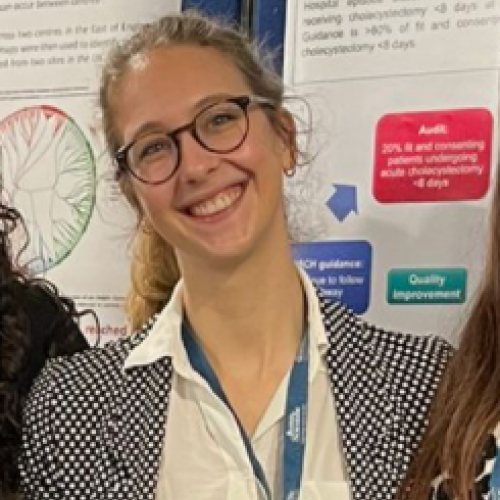
Dr Rosie Freer
Dr Rosie Freer is currently working as an Internal Medicine Trainee at St George’s Hospital, London. She delivers tutorials to Pembroke clinical medical students focused on Cardiology and Clinical Skills. She holds a PhD from The University of Cambridge, where she used large data sets to elucidate the molecular origins of Alzheimer's disease. She continues to be actively involved in academic research, applying her skills to focus on questions within the field of Cardiology.
- PhD in Chemistry, University of Cambridge (2014–2017)
Thesis: Molecular origins of tissue vulnerability to aberrant aggregation in protein misfolding diseases
Supervised by Prof. Michele Vendruscolo. Findings were published in Nature Neuroscience, Science Advances, PNAS and presented internationally - BM BCh, University of Oxford (2017–2021)
Awarded the Foulkes Foundation Fellowship for medical research. - MSci (Joint Hons in Physics & Biology), Durham University (2010–.2014)
Graduated with First Class Honours.
Dr Freer has broad interdisciplinary expertise across Cardiology, Biophysics, Data Analytics, Public Health, and Medical Education. Her PhD research utilised transcriptional signature data to advance understanding of brain tissue vulnerability in Alzheimer’s disease.
Her current research portfolio is focused on Cardiology, with recent work including a meta-analysis on familial screening in bicuspid aortic valve disease, published in the European Heart Journal (2023).
- R Freer, P Sormanni, G Vecchi, P Ciryam, CM Dobson, M Vendruscolo, 2016, A protein homeostasis signature in healthy brains recapitulates tissue vulnerability to Alzheimer’s disease Science advances 2 (8), e1600947
- R Freer, P Sormanni, P Ciryam, B Rammner, SO Rizzoli, CM Dobson, et al. 2019, Supersaturated proteins are enriched at synapses and underlie cell and tissue vulnerability in Alzheimer's disease Heliyon 5 (11)
- R Freer, A Rowett, CF Camm, 2020, An assessment of adherence to CARE reporting standards by case reports published in European Heart Journal–Case Reports in 2018, European Heart Journal: Case Reports 4 (5), 1
- Jonathan J H Bray, Rosie Freer, Alex Pitcher, Rajesh Kharbanda Family, 2023, screening for bicuspid aortic valve and aortic dilatation: a meta-analysis European Heart Journal, Volume 44, Issue 33, 1 September 2023, Pages 3152–3164
- H Fu, A Possenti, R Freer, Y Nakano, NC Hernandez Villegas, M Tang, et al., 2019, A tau homeostasis signature is linked with the cellular and regional vulnerability of excitatory neurons to tau pathology, Nature neuroscience 22 (1), 47-56 P
- Ciryam, R Kundra, R Freer, RI Morimoto, CM Dobson, M Vendruscolo, 2016, A transcriptional signature of Alzheimer’s disease is associated with a metastable subproteome at risk for aggregation, Proceedings of the National Academy of Sciences 113 (17), 4753-4758
- IMT1 Doctor, St George’s Hospital, London
- Clinical Lecturer, Pembroke College, University of Oxford
- Delivering tutorials on Cardiology and Clinical Skills to senior medical students
Dr Rosie Freer

Dr Rosie Freer is currently working as an Internal Medicine Trainee at St George’s Hospital, London. She delivers tutorials to Pembroke clinical medical students focused on Cardiology and Clinical Skills. She holds a PhD from The University of Cambridge, where she used large data sets to elucidate the molecular origins of Alzheimer's disease. She continues to be actively involved in academic research, applying her skills to focus on questions within the field of Cardiology.
- PhD in Chemistry, University of Cambridge (2014–2017)
Thesis: Molecular origins of tissue vulnerability to aberrant aggregation in protein misfolding diseases
Supervised by Prof. Michele Vendruscolo. Findings were published in Nature Neuroscience, Science Advances, PNAS and presented internationally - BM BCh, University of Oxford (2017–2021)
Awarded the Foulkes Foundation Fellowship for medical research. - MSci (Joint Hons in Physics & Biology), Durham University (2010–.2014)
Graduated with First Class Honours.
Dr Freer has broad interdisciplinary expertise across Cardiology, Biophysics, Data Analytics, Public Health, and Medical Education. Her PhD research utilised transcriptional signature data to advance understanding of brain tissue vulnerability in Alzheimer’s disease.
Her current research portfolio is focused on Cardiology, with recent work including a meta-analysis on familial screening in bicuspid aortic valve disease, published in the European Heart Journal (2023).
- R Freer, P Sormanni, G Vecchi, P Ciryam, CM Dobson, M Vendruscolo, 2016, A protein homeostasis signature in healthy brains recapitulates tissue vulnerability to Alzheimer’s disease Science advances 2 (8), e1600947
- R Freer, P Sormanni, P Ciryam, B Rammner, SO Rizzoli, CM Dobson, et al. 2019, Supersaturated proteins are enriched at synapses and underlie cell and tissue vulnerability in Alzheimer's disease Heliyon 5 (11)
- R Freer, A Rowett, CF Camm, 2020, An assessment of adherence to CARE reporting standards by case reports published in European Heart Journal–Case Reports in 2018, European Heart Journal: Case Reports 4 (5), 1
- Jonathan J H Bray, Rosie Freer, Alex Pitcher, Rajesh Kharbanda Family, 2023, screening for bicuspid aortic valve and aortic dilatation: a meta-analysis European Heart Journal, Volume 44, Issue 33, 1 September 2023, Pages 3152–3164
- H Fu, A Possenti, R Freer, Y Nakano, NC Hernandez Villegas, M Tang, et al., 2019, A tau homeostasis signature is linked with the cellular and regional vulnerability of excitatory neurons to tau pathology, Nature neuroscience 22 (1), 47-56 P
- Ciryam, R Kundra, R Freer, RI Morimoto, CM Dobson, M Vendruscolo, 2016, A transcriptional signature of Alzheimer’s disease is associated with a metastable subproteome at risk for aggregation, Proceedings of the National Academy of Sciences 113 (17), 4753-4758
- IMT1 Doctor, St George’s Hospital, London
- Clinical Lecturer, Pembroke College, University of Oxford
- Delivering tutorials on Cardiology and Clinical Skills to senior medical students